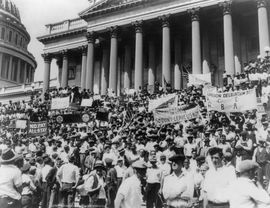
Just before Congress adjourned in the summer of 1932, thousands of desperate World War I veterans surrounded the U.S. Capitol. With the nation in the grips of the Great Depression, the House of Representatives had approved a bill to provide immediate cash payments to veterans. Servicemembers now waited anxiously as the Senate debated the same bill. At issue was the question, What did the nation owe its veterans?
After World War I, a Senate investigation into soldiers’ wartime pay found that enlisted men had received “very much less than that received by the lowest class of labor at home.” Veterans’ organizations, including the Veterans of Foreign Wars and the American Legion, lobbied Congress for additional compensation for those veterans. In 1922 the House and Senate approved a supplementary compensation bill, but President Warren G. Harding vetoed it. While he praised their service, Harding insisted that veterans would benefit more from a national tax cut than a one-time payment.1
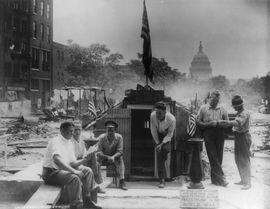
The veterans persisted in their demands, however, and in 1924 Representative Hamilton Fish of New York, a decorated World War veteran, introduced an amended proposal to provide veterans with “adjusted service” certificates redeemable in 1945. The Adjusted Compensation Act, later known as the Bonus Act, would provide to veterans “a deferred interest-bearing certificate payable in 1945 or, upon the veteran’s death, to his beneficiaries.” Veterans who applied for certificates would be entitled in 1945 to receive additional compensation for their service, one dollar for every day served stateside and $1.25 per day for overseas service, plus the four percent interest accumulated over two decades. The Senate Finance Committee recommended the bill’s passage. “The purpose of the bill,” the committee wrote, “is to give to the soldier who offered his life with his services a compensation that will more nearly approach that of the laborer who remained at home, secure from danger, and whose compensation increased from 200 to 300 per cent.” Congress passed the legislation in May 1924. President Calvin Coolidge vetoed the bill, objecting to the cost of the proposal and its burden on taxpayers for the subsequent two decades. He noted that Congress had already provided financial support to disabled veterans and the dependents of those who died in the war. “We owe no bonus to able-bodied veterans of the World War.…The gratitude of the nation to these veterans can not be expressed in dollars and cents.” Congress promptly overrode his veto and millions of World War veterans applied for their certificates.2
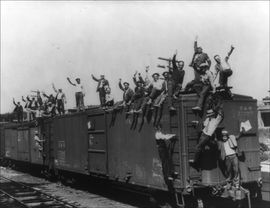
Nearly five years later, President Herbert Hoover declared that the nation’s future was “bright with hope” in his inaugural address of March 1929, but not everyone shared his optimism. Persistent unemployment among World War veterans prompted further congressional action. Two veterans, Representative Wright Patman of Texas and Senator Smith Brookhart of Iowa, introduced bills to provide for immediate—rather than delayed—certificate payments. In October of that year a stock market crash, combined with tightened credit and a historic drought, plunged an already fragile economy into a crippling economic depression. Unemployment rates skyrocketed. The abrupt economic downturn increased calls for immediate financial relief for veterans. In the fall of 1931, a small group of veterans “rode the rails” from Oregon to the Capitol, where they petitioned lawmakers for prompt payment of their certificates. Congress did not respond at that time, but as the nation’s economic conditions worsened, the number of veterans demanding early payment multiplied. In cities from coast to coast, veterans began to organize. They named their burgeoning movement the “Bonus Expeditionary Force” or BEF for short, a reference to the American Expeditionary Forces that had fought in Europe during the war, and planned a march on Washington.3
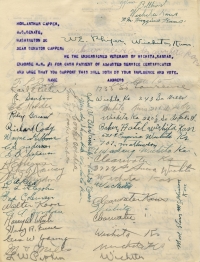
In the spring of 1932, BEF chapters from across the country converged on Washington, where veterans presented to members of Congress petitions with more than two million signatures supporting immediate certificate payments. Despite the growing intensity of the veterans’ effort, congressional leaders balked at their proposal. Senate Minority Leader Joseph T. Robinson of Arkansas announced his opposition: “I do not favor cash payments of adjusted service certificates.” With Congress focused on balancing budgets, editorials denounced the early payment proposal as fiscally irresponsible. “Two billion dollars cannot be picked from cherry trees by the Potomac,” opined the Chicago Tribune.4
Congress’s reluctance to address their demands did not deter veterans and their families from coming to Washington. Day after day, hundreds more arrived by foot, in cars, and by freight train. They built a sprawling shanty town on the Anacostia Flats and erected smaller encampments around the city. The BEF occupied deserted downtown buildings that were being demolished to make way for a new development known as the Federal Triangle. Soon the crowded camps, which lacked modern sanitation, posed public health problems. Dr. William Fowler, the District of Columbia’s health officer, declared the situation “frightful” and warned that “conditions are ideal for an outbreak of typhoid. The men bathe and wash their clothes in…the Potomac, and it is little more than an open sewer.” Despite the primitive living conditions, veterans vowed to remain in Washington. “We came here to stay until the bonus bill is passed,” declared one of the BEF leaders.5
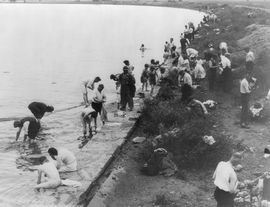
Disregarding the Hoover administration’s opposition to an early payment scheme, the House of Representatives narrowly approved a bill to provide for immediate redemption of the face value of the certificates. Next, the bill went to the Senate, where it was referred to the Finance Committee. Reed Smoot of Utah, the committee chairman, opposed the proposal, and the committee recommended that the bill “not pass.” “There is no evidence that the veterans as a class are any more in need than other groups of our citizens,” the committee report concluded. The Senate agreed to debate the bill the following day.6
On June 17, 1932, veterans packed the Senate galleries, impatient for the debate to begin. Thousands more crowded onto the East Front Plaza of the Capitol, where they awaited periodic updates from the bill’s supporters. Ten hours of contentious floor debate followed. Opponents argued that immediate cash payment of the certificates—the cost of which far exceeded the government’s annual revenues—was fiscally irresponsible. Others insisted that the best way to support veterans—and all the nation’s unemployed—would be a national works program, rather than early payment of certificates. The bill’s supporters noted that Congress had provided financial support to a variety of special interests during the economic depression. Senator John Blaine of Wisconsin reminded senators that Congress had set aside loan programs “designed for the railroads and the banks and the insurance companies and for the House of Morgan,” while the veterans’ bill was “designed for the relief of human misery.” Senator Thomas Schall of Minnesota pleaded with his colleagues, “We owe the veterans. Why keep them waiting until 1945?” But as the debate wore on, it became clear that the bill had only tepid support in the Senate. John “Elmer” Thomas of Oklahoma, the bill’s Senate sponsor, acknowledged its likely defeat. “When will the Senate of the United States pay this sacred and patriotic debt?” Thomas inquired. “My fellow Senators, are you proud of the record that has been made?…Billions for big business, but not a sou for soldiers!” Shortly after nine o’clock that evening, the Senate defeated the bill by a lopsided margin of 62 to 18. Outside the Capitol, reporters relayed the news to disappointed veterans, who broke into a chorus of “America” and then peacefully dispersed.7
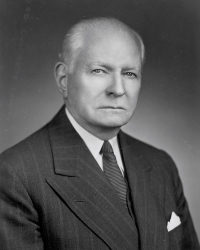
But the next morning, veterans returned to the Capitol, vowing to remain in Washington and continue lobbying Congress for immediate payment of their certificates. The Senate was unmoved by the ongoing demonstrations at the Capitol. Congress instead approved a bill to allow veterans to borrow against their certificates to cover food and transportation costs to return to their home states. Few took the loan option. Instead, veterans continued to stream into the capital city. As Congress prepared to adjourn, Vice President Charles Curtis grew so alarmed at the swelling crowd at the Capitol that he called in the Marines from the nearby barracks. They marched to the Crypt under the Capitol dome and awaited orders before Curtis abruptly revoked the order and sent them back to their barracks. Tensions between the BEF and elected officials, however, continued to mount.8
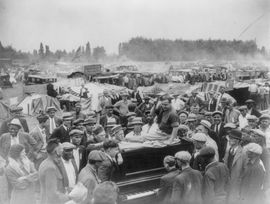
Congress adjourned on July 16, and four days later city officials issued an eviction notice to BEF leaders. The Hoover administration reasoned that, with Congress adjourned, the BEF no longer had a reason to remain in the city. A building contractor with salvage rights to the half-demolished buildings along Pennsylvania Avenue threatened to sue the government for financial losses because the BEF still occupied those buildings. More than 11,600 veterans had taken up residency in abandoned buildings and shanty towns, and hundreds of women and children occupied the camps, too.
The eviction process began peacefully on July 28, but violence soon erupted. When Washington police attempted to evict the squatters, the veterans threw bricks and the police opened fire, killing two veterans. Fearing a riot, President Hoover called out the U.S. Army, under General Douglas MacArthur's command. MacArthur pledged to “break the back of the BEF.” Tanks rolled into the capital city and soldiers, with fixed bayonets, began rounding up veterans and bystanders alike. MacArthur’s soldiers not only emptied out the Pennsylvania Avenue buildings but crossed the Anacostia River and set fire to the largest BEF camp. The next day’s newspapers featured photographs of the army routing its own veterans.9
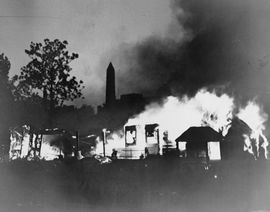
The demands of the Bonus Expeditionary Force in 1932, and the electoral consequences that followed its expulsion from Washington, taught some members of Congress a lesson they would not soon forget. Americans blamed Hoover and many of his congressional allies for mistreating the BEF and failing to end the Great Depression. In the November 1932 presidential election, Franklin D. Roosevelt bested Hoover in a landslide, and 14 Senate incumbents lost reelection. Over the next two Congresses, those who favored immediate certificate payments gained new allies among freshmen members more sensitive to the plight of veterans. In 1936 bipartisan majorities in Congress finally approved the immediate payment of certificates. Eight years later, with the nation again at war, Congress passed the GI Bill of Rights as a more productive and humane way of recognizing and rewarding America’s returning World War II veterans.
Notes
2. Paul Dickson and Thomas B. Allen, The Bonus Army: An American Epic (Mineola, NY: Dover Publications, Inc., 2020), 21–28; Stephen R. Ortiz, Beyond the Bonus March and GI Bill: How Veteran Politics Shaped the New Deal Era (New York: New York University Press, 2010), 27–28; Senate Committee on Finance, Veterans’ Adjusted Compensation Bill, 67th Cong. 1st sess., S. Rpt. 133, 1; Calvin Coolidge, “Message to the House of Representatives Returning Without Approval a Bill Providing for Adjusted Compensation for War Veterans,” May 15, 1924, Calvin Coolidge Presidential Foundation, accessed November 1, 2023, https://coolidgefoundation.org/resources/message-to-the-house-of-representatives-returning-without-approval-a-bill-providing-for-adjusted-compensation-for-war-veterans/.
3. “Inaugural Address of Herbert Hoover,” March 4, 1929, The Avalon Project, accessed November 1, 2023, https://avalon.law.yale.edu/20th_century/hoover.asp; Dickson and Allen, Bonus Army, 59.